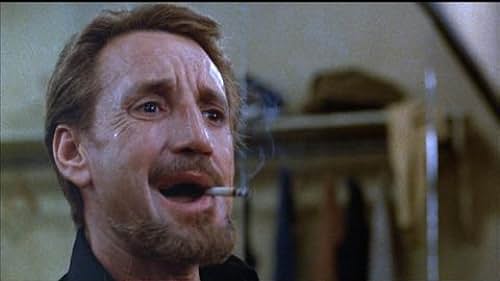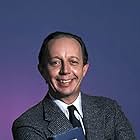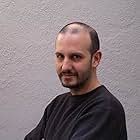Director/choreographer Bob Fosse tells his own life story as he details the sordid career of Joe Gideon, a womanizing, drug-using dancer.Director/choreographer Bob Fosse tells his own life story as he details the sordid career of Joe Gideon, a womanizing, drug-using dancer.Director/choreographer Bob Fosse tells his own life story as he details the sordid career of Joe Gideon, a womanizing, drug-using dancer.
- Won 4 Oscars
- 12 wins & 14 nominations total
Irene Kane
- Leslie Perry
- (as Chris Chase)
Susan Brooks
- Stacy
- (as Sue Paul)
- Director
- Writers
- All cast & crew
- Production, box office & more at IMDbPro
Featured reviews
I just saw the movie for the first time since its initial release and was struck by how well it holds up. The casting alone is quite remarkable, the set design is often striking, and the entire roman-a-clef peek inside the life of Bob Fosse remains fascinating.
There are at least two more pieces of "insider" ironic casting that appears to have not been mentioned. One was the casting of Cliff Gorman as the stand-up comedian in the "Lenny"-type movie-within-the-movie (here called "Stand-up"). Gorman originated the part of Lenny Bruce in the original Broadway version of "Lenny," but lost the movie role to Dustin Hoffman.
The other is the casting of Ann Reinking as Gideon's lover. Ann Reinking was Fosse's lover in real life.
There are at least two more pieces of "insider" ironic casting that appears to have not been mentioned. One was the casting of Cliff Gorman as the stand-up comedian in the "Lenny"-type movie-within-the-movie (here called "Stand-up"). Gorman originated the part of Lenny Bruce in the original Broadway version of "Lenny," but lost the movie role to Dustin Hoffman.
The other is the casting of Ann Reinking as Gideon's lover. Ann Reinking was Fosse's lover in real life.
One of the most gleefully indulgent, self-loathing films ever made- yet watchable as a train wreck, thanks to its bravery, wit and overall excellence.
Scheider is unexpectedly effective as the director's mirror image, a talented louse who deserves what he gets. I can only imagine the smirk that must have been on Fosse's face throughout this production. He doesn't ask for forgiveness, he doesn't try to justify Gideon's behavior, and he certainly didn't encourage Scheider to be sympathetic. "You're right, I'm a bastard," he seems to be saying.
While catchy and professional, the musical numbers (particularly the art direction and costumes) range from tasteless to bombastic- as they were intended, I think. The choreography is precise, the editing masterful, and the performances in sharp focus. These elements, plus the acerbically mournful script, make for a fascinating deconstruction of self to an extent rarely, if ever, seen in the movies.
Not every artist should think himself so interesting, but thankfully, both Fosse's professional and personal life merited such honest examination. I can't think of any of our more iconic filmmakers today who have been turned the camera back on themselves in such unflinching fashion.
Note: Among the direct parallels to Fosse's actual career are "The Stand-Up" to "Lenny", and Lithgow's snooty Lucas Sergeant to theatre's estimable Harold Prince.
Scheider is unexpectedly effective as the director's mirror image, a talented louse who deserves what he gets. I can only imagine the smirk that must have been on Fosse's face throughout this production. He doesn't ask for forgiveness, he doesn't try to justify Gideon's behavior, and he certainly didn't encourage Scheider to be sympathetic. "You're right, I'm a bastard," he seems to be saying.
While catchy and professional, the musical numbers (particularly the art direction and costumes) range from tasteless to bombastic- as they were intended, I think. The choreography is precise, the editing masterful, and the performances in sharp focus. These elements, plus the acerbically mournful script, make for a fascinating deconstruction of self to an extent rarely, if ever, seen in the movies.
Not every artist should think himself so interesting, but thankfully, both Fosse's professional and personal life merited such honest examination. I can't think of any of our more iconic filmmakers today who have been turned the camera back on themselves in such unflinching fashion.
Note: Among the direct parallels to Fosse's actual career are "The Stand-Up" to "Lenny", and Lithgow's snooty Lucas Sergeant to theatre's estimable Harold Prince.
Bob Fosse's autobiographical look at the hectic life of a Broadway director/choreographer rehearsing a new show in New York City while concurrently editing his latest movie. Roy Scheider fabulously stands in for Fosse; as Joe Gideon, pill-popping, womanizing, self-destructive genius on the verge of collapse, it is Scheider's shining moment as an actor. Fosse paints himself as suspicious, paranoid, driven, indifferent, exhausted and horny. It's more than most of us want to know about the man, who seems intent on showing us what a creep he is...but a talented creep! The film doesn't particularly look good (it's a gray movie), though it has amazing musical flourishes and the self-styled bombast is actually rather amusing once you get the idea. Jessica Lange is beautiful in an early role as the Angel of Death (imagine Fosse explaining that role to her!), and Scheider's performance is really something to see (only occasionally does the camera catch him not knowing what to do). Fosse tries hard not to be pretentious, he keeps things playful and perky, and his ironic ending is bitterly funny. The film is alive and ticking--but that's not Fosse's heart, it's a time bomb. *** from ****
To think that Fosse synthesized musical theater, artistic obsession, relationships, fatherhood, and satire all within the framework of a deconstructionist film musical and made it all about himself to boot (including predicting the manner of his own death) without being the least bit self-congratulatory is amazing. The film is edited beautifully; choreographed flawlessly; lit with stark colors that almost fade to black and white at times; and acted with heart and verve, especially by Roy Scheider. The film has one of the most effective uses of the zoom lens (despised by most filmmakers precisely for their inability to figure out when to use it) in film history. The shot pulls back from a lone choreographer on the stage while multitudes of bodies go flying by him, letting us feel his insurmountable task of choosing which of these people will make his show come alive. Some may say the final series of musical numbers runs long but I defy anyone these days to sustain a musical film with the same success. "Moulin Rouge" and "Chicago", excellent films that they are, play their cards fast and furious, hoping to razzle-dazzle us just long enough that we'll stay tuned. "All That Jazz" dares to show you a taste of musicals to come ("Take Off With Us") and yet insists you remember where the form came from (the Busby Berkely-esque "Who's Sorry Now?"). When will they come out with the DVD? We can only hope soon.
Fosse's ALL THAT JAZZ has been mistaken for a rip-off of Fellini's 8 1/2 for some time. But that is giving it short shrift as an illuminating, sobering account of one man's burnout in the face of enormous pressure from the elements of the entertainment industry which he's involved himself in, namely Broadway and the film industry. Based on Fosse's experiences directing CHICAGO on Broadway and LENNY for United Artists, it stars Roy Scheider as Fosse's always black-dressed alter ego Joe Gideon, who's long road to success has been dotted with drug addictions, one-night stands, betrayals, and show biz phoniness.
Particularly of interest in this film is the strong autobiographical quality of it. Fosse did, indeed, suffer his first heart attack during this 1973/74 period of his life. The film-within-the-film, "The Stand Up," is an interesting variation on LENNY (1974, with Dustin Hoffman and Valerie Perrine)---much more irritating than that movie. LENNY ended up getting great reviews, for the most part, but it must have been a tough movie for Fosse to get his hands around, especially while dealing with his failed marriage to Broadway star Gwen Verdon (portrayed here by Leland Palmer). It's certainly portrayed as such in this film. And Chicago seems to have been a challenge for him, too. He obviously thought the original script for that show was lacking (as he actually went on record as saying) and that he had to spice it up for him to become interested in it. (How fascinating would a Fosse film version of CHICAGO have been? As it was, it looks as if eventual CHICAGO director Rob Marshall screened ALL THAT JAZZ many times in order to mine its many storytelling treasures, including the main conceit that most of the film's musical numbers appear in the minds of the main characters.)
Scheider has never been better and deserved real consideration as that year's Best Actor Oscar-winner (he lost, ironically, to Dustin Hoffman who won for KRAMER VS. KRAMER). He is positively channeling his director's personality, down to his constant cigarette smoking and his artsy goatee (not to mention his snaky, rakish attitudes towards personality responsibility). The fine cast also includes: John Lithgow as a rival Broadway director who may or may not take over Joe's show if he dies on the operating table; Max Wright (the dad on ALF) as the producer of Gideon's film; Sandahl Bergman (from CONAN and RED SONJA) as the lead dancer in the "Take Off With Us" musical number that disappoints the stage show's backers; longtime Fosse girlfriend and dancer Ann Reinking as Gideon's other serious bedmate; Cliff Gorman as Davis Newman, the lead actor in "The Stand Up"; the lovely Erezebet Foldi as Gideon's precocious daughter (Fosse's real daughter, Nicole, later appeared in the film version of A CHORUS LINE); Jessica Lange in her first serious role as the Angel of Death; Keith Gordon (an actor in CHRISTINE and BACK TO SCHOOL, who's now an acclaimed director of films like MOTHER NIGHT and the 2003 film adaptation of THE SINGING DETECTIVE) as the young Joe Gideon; Ben Vereen, energetic as a show-biz veteran who "hosts" Gideon's final decent into death. The list goes on and on....
And the tech credits are superb. The film won Oscars for its Tony Walton sets (Tony Walton has been married to Julie Andrews for years, and is an acclaimed stage and film set designer), its Alan Heim editing (Heim worked on NETWORK, among other things), its Ralph Burns scoring (which includes old jazz, classical, pop, and Broadway standards), and its Albert Wolsky costumes. Its photography, by Giuseppe Rotunno, is also great (Rotunno phtographed many Fellini films and probably had much to do with the lumping of Fosse's film in with Fellini's work).
Tying in 1979 with APOCOLYPSE NOW for Cannes Palme D'Or, this is one of the greatest movies ever made, I think, and you'll know that once the first moments--a mass stage audition unbelievably well-edited to the tune of George Benson's version of "On Broadway"--unreel in front of you. It's an unflinching look into the madness of one artist that, eventually, became his undoing (Fosse died in 1986, in his early 60s, of another heart attack, after completing only one more movie, STAR 80, and one more stage show, BIG DEAL). See it and prepare to be moved in strange ways.
Particularly of interest in this film is the strong autobiographical quality of it. Fosse did, indeed, suffer his first heart attack during this 1973/74 period of his life. The film-within-the-film, "The Stand Up," is an interesting variation on LENNY (1974, with Dustin Hoffman and Valerie Perrine)---much more irritating than that movie. LENNY ended up getting great reviews, for the most part, but it must have been a tough movie for Fosse to get his hands around, especially while dealing with his failed marriage to Broadway star Gwen Verdon (portrayed here by Leland Palmer). It's certainly portrayed as such in this film. And Chicago seems to have been a challenge for him, too. He obviously thought the original script for that show was lacking (as he actually went on record as saying) and that he had to spice it up for him to become interested in it. (How fascinating would a Fosse film version of CHICAGO have been? As it was, it looks as if eventual CHICAGO director Rob Marshall screened ALL THAT JAZZ many times in order to mine its many storytelling treasures, including the main conceit that most of the film's musical numbers appear in the minds of the main characters.)
Scheider has never been better and deserved real consideration as that year's Best Actor Oscar-winner (he lost, ironically, to Dustin Hoffman who won for KRAMER VS. KRAMER). He is positively channeling his director's personality, down to his constant cigarette smoking and his artsy goatee (not to mention his snaky, rakish attitudes towards personality responsibility). The fine cast also includes: John Lithgow as a rival Broadway director who may or may not take over Joe's show if he dies on the operating table; Max Wright (the dad on ALF) as the producer of Gideon's film; Sandahl Bergman (from CONAN and RED SONJA) as the lead dancer in the "Take Off With Us" musical number that disappoints the stage show's backers; longtime Fosse girlfriend and dancer Ann Reinking as Gideon's other serious bedmate; Cliff Gorman as Davis Newman, the lead actor in "The Stand Up"; the lovely Erezebet Foldi as Gideon's precocious daughter (Fosse's real daughter, Nicole, later appeared in the film version of A CHORUS LINE); Jessica Lange in her first serious role as the Angel of Death; Keith Gordon (an actor in CHRISTINE and BACK TO SCHOOL, who's now an acclaimed director of films like MOTHER NIGHT and the 2003 film adaptation of THE SINGING DETECTIVE) as the young Joe Gideon; Ben Vereen, energetic as a show-biz veteran who "hosts" Gideon's final decent into death. The list goes on and on....
And the tech credits are superb. The film won Oscars for its Tony Walton sets (Tony Walton has been married to Julie Andrews for years, and is an acclaimed stage and film set designer), its Alan Heim editing (Heim worked on NETWORK, among other things), its Ralph Burns scoring (which includes old jazz, classical, pop, and Broadway standards), and its Albert Wolsky costumes. Its photography, by Giuseppe Rotunno, is also great (Rotunno phtographed many Fellini films and probably had much to do with the lumping of Fosse's film in with Fellini's work).
Tying in 1979 with APOCOLYPSE NOW for Cannes Palme D'Or, this is one of the greatest movies ever made, I think, and you'll know that once the first moments--a mass stage audition unbelievably well-edited to the tune of George Benson's version of "On Broadway"--unreel in front of you. It's an unflinching look into the madness of one artist that, eventually, became his undoing (Fosse died in 1986, in his early 60s, of another heart attack, after completing only one more movie, STAR 80, and one more stage show, BIG DEAL). See it and prepare to be moved in strange ways.
Did you know
- TriviaUpon the movie's release in 1979, Stanley Kubrick reportedly believed this to be the "best movie I think I've ever seen."
- GoofsIn a closeup of the back of Joe's head during Bye, Bye Love number, a large strip of Scotch tape is inexplicably running across back of his head.
- Quotes
Dancer Backstage: Fuck him! He never picks me!
Dancer Backstage: Honey, I *did* fuck him and he never picks me either.
- Crazy creditsThere are no opening credits, only the company credits and the title, which resemble revolving Broadway lights.
- SoundtracksOn Broadway
Written by Barry Mann, Cynthia Weil, Jerry Leiber, and Mike Stoller
Performed by George Benson
Courtesy of Warner Bros Records, Inc.
- How long is All That Jazz?Powered by Alexa
Details
- Release date
- Country of origin
- Official site
- Languages
- Also known as
- El show debe seguir
- Filming locations
- Production companies
- See more company credits at IMDbPro
Box office
- Budget
- $12,000,000 (estimated)
- Gross US & Canada
- $37,823,676
- Opening weekend US & Canada
- $86,229
- Dec 25, 1979
- Gross worldwide
- $37,825,158
- Runtime
- 2h 3m(123 min)
- Color
- Aspect ratio
- 1.85 : 1
Contribute to this page
Suggest an edit or add missing content




































